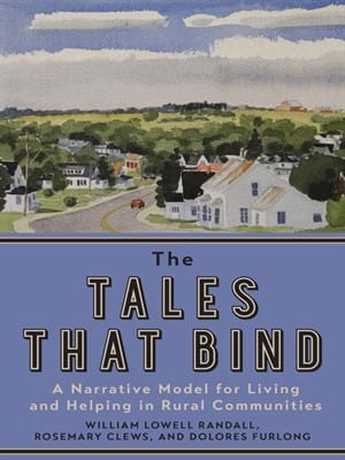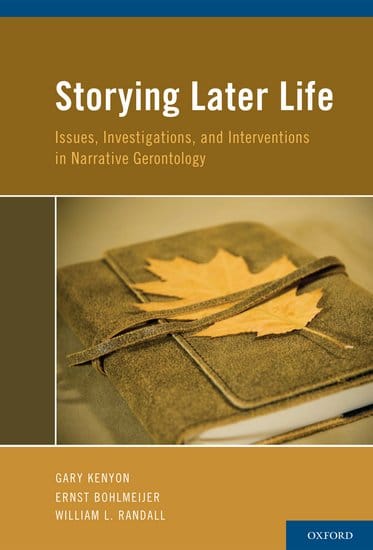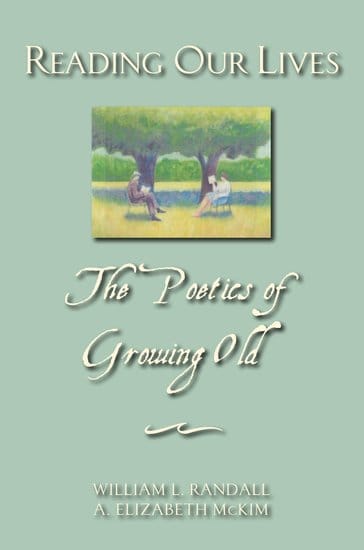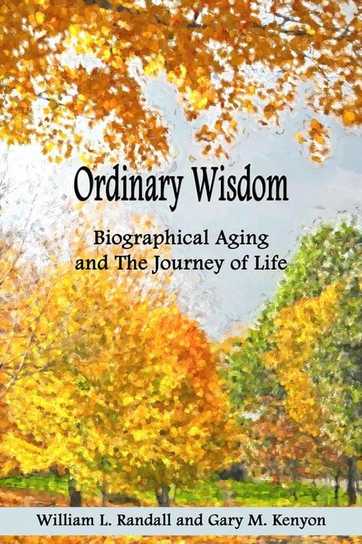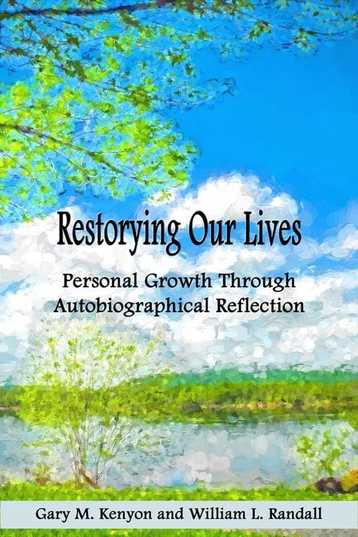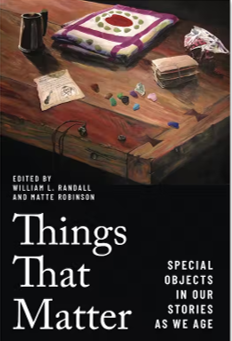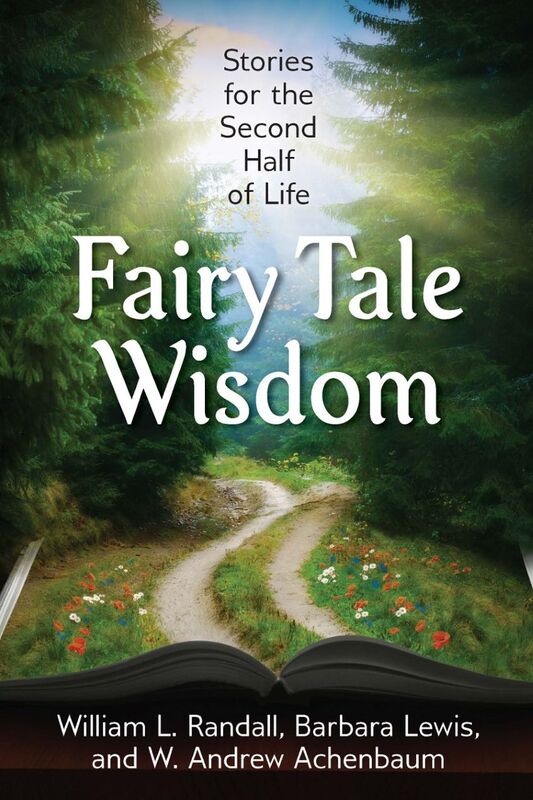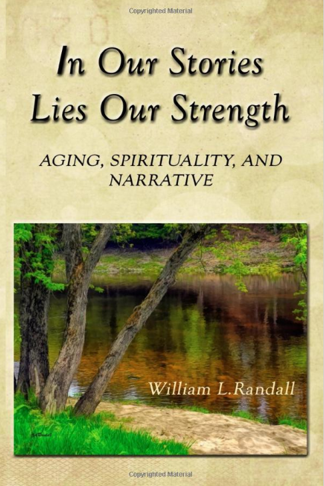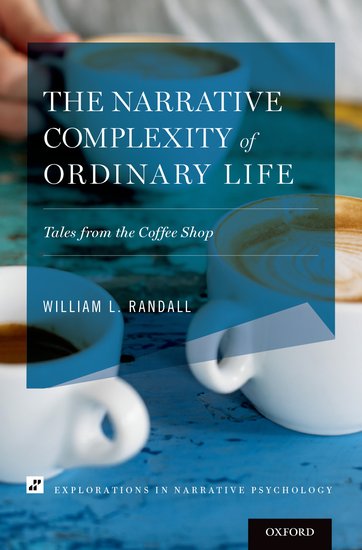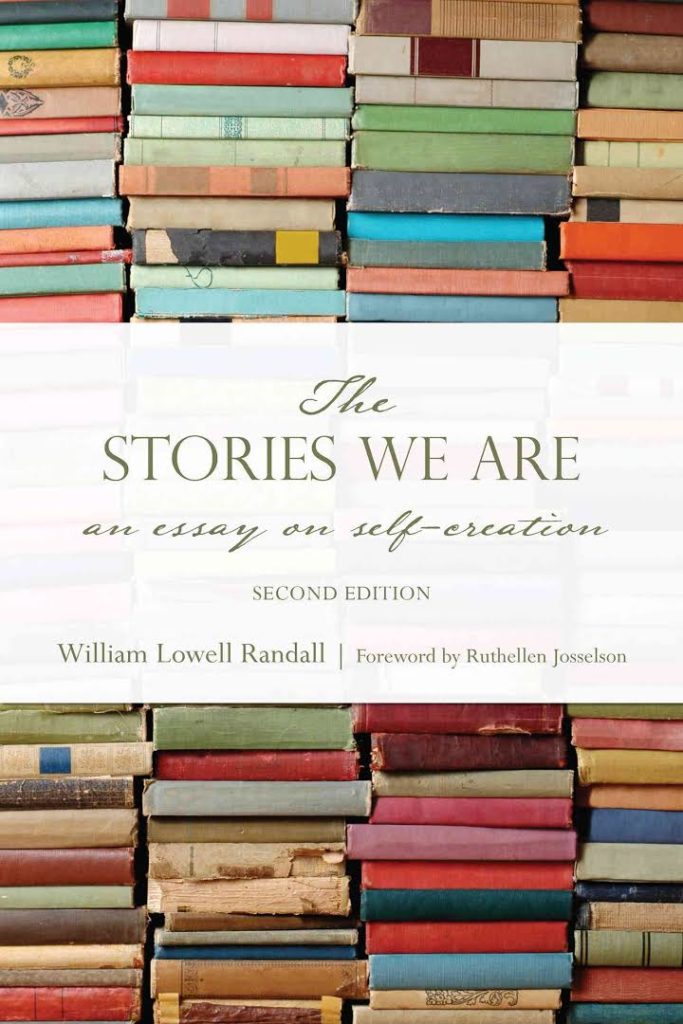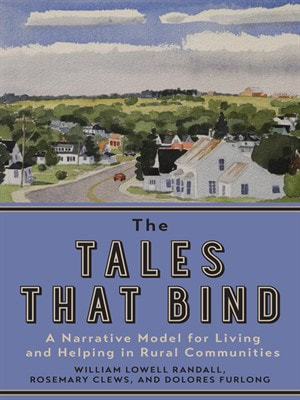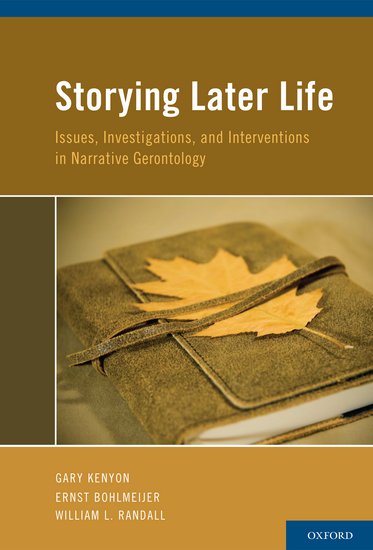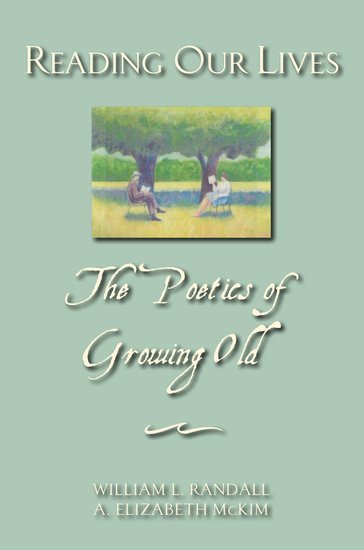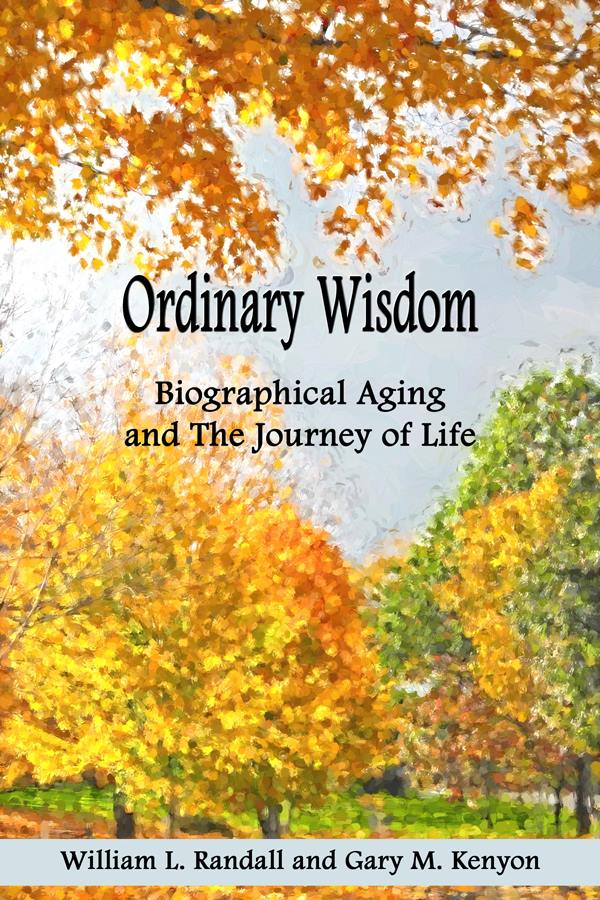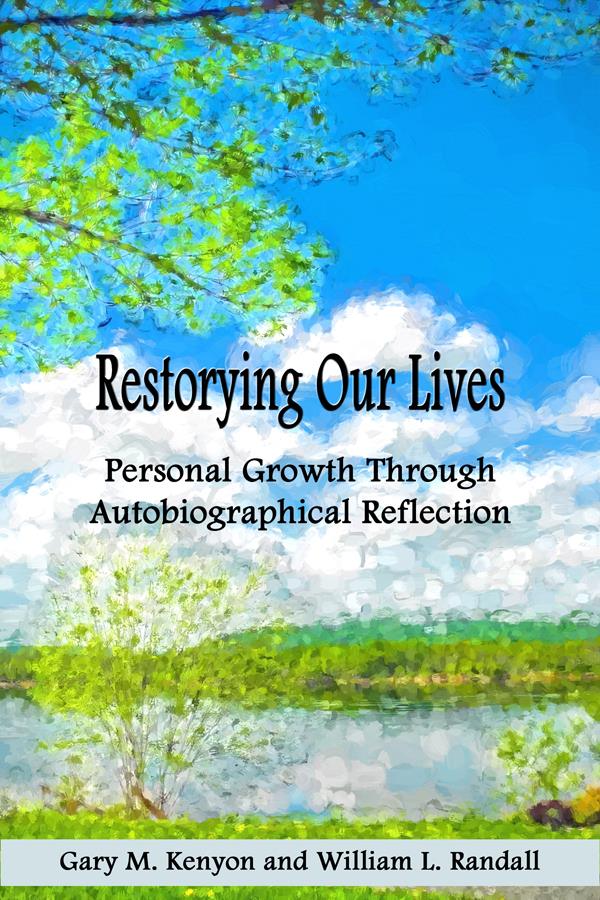AUTHOR |
Bill Randall is a leading authority on the subject of narrative in relation to aging, community building, and care.
Below you will find a list of his books and a link to purchase.
Enjoy.
Below you will find a list of his books and a link to purchase.
Enjoy.
Things That Matter: Special Objects in Our Stories as We Age
"This book reminds us that narratives are not just about the stories we tell – they also include the personal objects that embody rich meaning in our lives."
Kate de Medeiros, Professor of Gerontology, Concordia University
Kate de Medeiros, Professor of Gerontology, Concordia University
|
Many of us have particular things in our lives – photographs, paintings, old letters, books, furniture, jewellery, or clothing – that hold special meaning for us. Often, they correspond to pivotal memories and can be central to our sense of self and our life narratives, all the more so as we age. Things That Matter sheds important light on the intricate intertwining of mementos with stories – and vice versa – in most people’s lives.
The book explores the significance of cherished objects within the life stories of nine participants in a qualitative study of the links between reminiscence and resilience in later life. The researchers who conducted the study represent a variety of fields, including gerontology, social work, ministry, nursing, literature, and education. The book details how life stories can be fraught with a wide range of insights and questions from the memories that get stirred up as people embark on the process of "life review" prompted by the challenges and changes of aging. Shedding light on the complex emotional, psychological, and spiritual findings of the study, Things That Matter ultimately reveals the intricacy of personal narrative and the incredible ways in which things and stories are interwoven in our lives over time. |
"Things That Matter is the fruit of a truly communal, interdisciplinary collaboration between scholars and practitioners intrigued by the myriad ways in which people’s cherished objects serve as ‘portals’ into the stories of their lives during the course of later life. This thoughtful, engaging book is thus also about stories that matter and is a most valuable site for exploring, and honouring, the living, breathing story worlds that we enter, and re-enter, throughout our lives."
Mark Freeman, Distinguished Professor of Ethics and Society, College of the Holy Cross
Mark Freeman, Distinguished Professor of Ethics and Society, College of the Holy Cross
“Fairy Tale Wisdom contains the personal reflections of three sensitive and intelligent people on a few of the great stories. They put themselves into the tales, or put the tales in them, and offer ways to both appreciate important narratives and make sense of your life, especially as you grow older.
I like most the sincere probing that goes on in the reflections of these extraordinary authors.”
Thomas Moore, author of Care of the Soul and Soul Therapy
|
Later life, for all the challenges and changes that come with it, is a time to embark upon a uniquely exciting adventure. It is, in many ways, an inner journey, one of deepening our understanding of our lives and our selves by tapping into the rich cache of experiences that have assembled silently inside of us through the years. When viewed with insight, openness and wonder, aging is an adventure in truly growing older, rather than—passively, resignedly—getting older.
In Fairy Tale Wisdom, authors Bill Randall, Barbara Lewis, and Andy Achenbaum crawl inside an assortment of fables, parables, and other stories that they recall from their childhood and revisit them as older adults. They re-read—and re-member—timeless tales like Hansel and Gretel, The Ugly Duckling, The Tortoise and The Hare, plus many others, through the lens of the still-unfolding stories of their own lives, with all the losses and loves, the layers and learning that 70-odd years involve. Reflecting on these stories with a blend of playfulness and seriousness, the authors find themselves asking questions, making out patterns, and stumbling onto truths (not always comfortable) to which they might otherwise be blind. This delightful book is an invitation to see these old tales with fresh eyes and celebrate the wisdom that lurks between the lines of your own life. |
"In Our Stories Lies Our Strength: Aging, Spirituality, and Narrative"
|
"In Our Stories Lies Our Strength: Aging, Spirituality, and Narrative" is aimed at thoughtful older adults who are committed to aging as creatively, as positively, and as resiliently as possible amid the challenges and changes that come with later life. It is aimed as well, though, at professionals and volunteers who offer spiritual care to older adults in a wide range of settings, from hospitals to nursing homes, from hospice to rehabilitation, and from religious congregations to community centers. These include: chaplains, pastors, rabbis, priests, parish nurses, social workers, therapists, spiritual directors, and volunteers - anyone whose calling is to listen deeply to older adults’ stories and, in the process, help them to re-story in healing and life-affirming ways. "Bill Randall entices us to cultivate stories, as listeners and tellers as we journey through life. In the process, he offers fresh insights into the ways in which mining our own and other's stories helps us age with resilience, optimism and grace. Masterfully weaving together the themes of aging, spirituality and narrative, the book is filled with stories, both humorous and touching. He charts a path for scholars, teachers, clinicians as well as the general reader interested in deepening their understanding of the ways in which stories guide our growth, help us heal and hold the power to transform our lives. A joy to read!" Karen Skerrett, PhD "This book really spoke to me, and reaffirmed a core belief of mine, which is simply stated in the title. Dr. Randall has woven his decades of research, knowledge, insights, experiences, and personal stories into a beautifully written musing on the journey we all take in life. It's full of valuable wisdom for those seeking to understand their own, and others experiences, while grappling with the complexities therein. With an open mind and heart he both encourages and challenges the reader to listen/pay attention to and examine the stories that our realities are rooted in and created by. There is a positive quality to the book that inspires reflection, mindfulness and connectedness. I think there is something in this book for everyone, be they academic, practitioner, or simply another living, breathing story that has questions. Time to read it again." C.Blizzard |
The Narrative Complexity of Ordinary Life: Tales from the Coffee Shop
|
In The Narrative Complexity of Ordinary Life, which is part of a series by Oxford University Press devoted to the topic of “narrative psychology”, William L. Randall shows how concepts central to the study of narrative psychology--such as narrative development and the interrelation between narrative and identity, cognition, emotion, and development--are integral to everyday life. He makes the case that all people function as narrative psychologists by continually storying their lives in memory and imagination, as well as speculating on the stories that others may be living too, a process that Randall refers to as “storyotyping.”
“As his book’s main setting, Randall tackles the old riddle of how life and stories are interwoven from a surprisingly down-to-earth vantage point. This makes for straightforward and highly readable reflections on the narrative complexity of ordinary life” (Jens Brockmeier, Professor of Psychology, American University of Paris) “Thinking about narrative psychology with the aid of narrative thought, telling stories about ‘me’ and stories about story, Bill Randall shares his fresh insights with the readers and creates a beautiful, rich tapestry. In a coffee shop, free to be himself, making a journey that roams through time and space, he immerses himself in the stories of his and others’ lives, and in doing so he captures the essence of how we ‘narrativize’ our lives.” (Amia Lieblich, Professor Emeritus of Psychology, Hebrew University) READ MORE |
The Stories We Are: An Essay on Self-Creation
|
From time to time we all tend to wonder what sort of “story” our life might comprise: what it means, where it is going, and whether it hangs together as a whole. In The Stories We Are, William Lowell Randall explores the links between literature and life and speculates on the range of storytelling styles through which people compose their lives. In doing so, he draws on a variety of fields, including psychology, psychotherapy, theology, philosophy, feminist theory, and literary theory.
“While many authors have detailed the many branches of self and story-making that constitute human life, few have done so with the range of scholarship and intellectual thoroughness that infuses Randall’s classic book.” (Ruthellen Josselson, Professor of Clinical Psychology, Fielding Graduate University) “A rich and comprehensive investigation into the metaphor of life as story ... The Stories We Are is a well-written and well thought out work. It presents a very complex metaphor in a not simple but coherent and effective manner. It is a fascinating journey through the life as story metaphor.” (Gary Kenyon Canadian Journal on Aging) READ MORE |
The Tales that Bind: A Narrative Model of Living and Helping in Rural Communities
|
Drawing on in-depth interviews conducted with more than forty practitioners working in a range of professions and communities throughout rural New Brunswick, Canada, The Tales that Bind presents a narrative approach to facing these challenges. Using fictionalized vignettes and autobiographical sketches, the authors argue that success as rural practitioners requires “knowing the story” – whether that is personal, communal, or regional in nature.
An accessible, practical guide to using narrative techniques in practice, The Tales that Bind is a unique resource for students, teachers, and professionals who work - or anticipate working - within small rural settings. “Building upon research done over the past several decades on the importance of narrative and story, The Tales that Bind applies these theories to Canadian rural realities. A contribution to an area where relatively little has been published, this book will be a highly useful read for professionals who are working, or wish to work, in rural settings.” (John H. Young, School of Religion, Queen’s University) READ MORE |
Storying Later Life: Issues, Investigations, and Interventions in Narrative Gerontology
|
This volume reflects a selection of new directions and insights, and constitutes a general broadening and deepening of narrative gerontology, exploring its implications for theory and research in the field of aging, and for the quality of life of older adults themselves. Such deepening indicates a greater refinement of thought, method, and intervention. The evolution of narrative gerontology is also evidenced by a significant increase in the number of faculty and graduate students engaged in research in this area, as well as by increasing collaboration among researchers, practitioners, and administrators in applying narrative insights to contexts such as long term care - indeed, healthcare in general. These initiatives have given rise to the phrase "narrative care as core care". “This brilliant collection of articles on aging reflects a new and enlightened approach to the study of the human life course. Aging can only be understood in terms of what individuals make of their lives as lived – which, in turn, is deeply influenced by what the broader culture in which they live makes of the life course. This newer, broader view of the aging process is revolutionizing gerontology, but even more important, it is greatly enriching how ordinary people view the challenges of life as they grow older. The book is gripping in its challenge, required reading for those concerned with the realization of individual life histories.” (Jerome Bruner, Research Professor of Psychology, New York University, and Senior Research Fellow, New York University School of Law) READ MORE |
Reading Our Lives: The Poetics of Growing Old
|
Against the background of Socrates' insight that the unexamined life is not worth living, Reading Our Lives: The Poetics of Growing Old investigates the often overlooked inside dimensions of aging. Despite popular portrayals of mid- and later life as entailing inevitable decline, this book looks at aging as, potentially, a process of poiesis: a creative endeavor of fashioning meaning from the ever-accumulating texts - memories and reflections-that constitute our inner worlds. At its center is the conviction that although we are constantly reading our lives to some degree anyway, doing so in a mindful matter is critical to our development in the second half of life.
“Reading Our Lives offers a philosophically grounded and neurobiologically sound perspective for examining late life. As such, it challenges the reader to bring this perspective to bear in understanding and helping the elderly patient." (The American Journal of Psychiatry) "The book is geared toward those interested in the psychology of aging...[yet] its explorations into the neural basis of memory, especially autobiographical memory, make it a resource for cognitive neuroscientists as well. The prose-like style (as opposed to scientific language) extends the audience to those interested in the aging processes. Recommended." (Choice) READ MORE |
Ordinary Wisdom: Biographical Aging and the Journey of Life
|
What wisdom is exactly has vexed thinkers throughout the history of thought. Indeed, for much of modern times, the topic has been taboo, given the intellectual climate created by such movements as analytic philosophy, behaviorist psychology, and cognitive science.
This book adds to a growing movement that is reclaiming wisdom as a meaningful concept by viewing human development in terms of metaphors that enrich models like mind-as-computer - which proposes mental activity is reducible to processing information. Instead, Randall and Kenyon's guiding metaphors are “life-as-story” and “life-as-journey”, and their conceptual extension, “life-as-adventure”: ordinary metaphors with extraordinary implications. “... relevant to a range of readers looking to understand meaning and significance in everyday life. ... Ordinary Wisdom goes deeply into the narrative perspective, explaining its origins - philosophical, psychological, and spiritual-and its effects in everyday life. .... A central theme of Ordinary Wisdom is that we must learn to age consciously, accepting the aging process and taking responsibility for creating our own experience of aging.” (Ruth Ray, The Gerontologist) READ MORE |
Katherine - 5.0 out of 5 stars Five Stars
February 28, 2015 - Published on Amazon
Perfect.
E James LIEBERMAN - 5.0 out of 5 stars
The Genuine Article - August 2, 2008 - Published on Amazon
W. Randall, minister, adult educator and English teacher focuses on the art of living; G. Kenyon, philosopher and gerontologist looks at biographical (vs. biological) aging and the nature of gerontological thought. The focus is very much on stories--life stories, autobiography; also adventure, journey, death and the meaning of wisdom. It's well-organized, humane, literate, sensible, attractively readable and important.
February 28, 2015 - Published on Amazon
Perfect.
E James LIEBERMAN - 5.0 out of 5 stars
The Genuine Article - August 2, 2008 - Published on Amazon
W. Randall, minister, adult educator and English teacher focuses on the art of living; G. Kenyon, philosopher and gerontologist looks at biographical (vs. biological) aging and the nature of gerontological thought. The focus is very much on stories--life stories, autobiography; also adventure, journey, death and the meaning of wisdom. It's well-organized, humane, literate, sensible, attractively readable and important.
Restorying Our Lives: Personal Growth Through Autobiographical Reflection
|
This is a new and important contribution to the explosion of contemporary interest in life as story and lifestories. Written in a lively and readable manner, the book explores theoretical, practical, ethical, and personal aspects of this fascinating topic area. It invites the reader, whether professional or general, to realize the potential to restory his or her own life and to coauthor others' lives in a positive way. This book is a refreshingly readable blend of practical insight and academic analysis concerning the familiar, but fascinating metaphor: “the story of my life”. It offers an engaging perspective on the aesthetic dimensions of composing (or storying) our lives. Woven around numerous entailments of the life-as-story metaphor, like plot, character, theme, point of view, and setting, it introduces a variety of novel concepts, such as coauthoring, biographical coaching, biographical aging, narrative environment, larger stories, radical restorying, and storying style in order to probe the complex hermeneutical and ethical issues surrounding the storytelling/storylistening exchange that is integral to therapeutic care, qualitative research, and, indeed, everyday life. "In Restorying Our Lives, Gary Kenyon and William Randall present some of the latest thinking about the meaning and the making of life stories. Their comprehensive and thoughtful discussion of the stories we live by will prove illuminating for psychological theorists, researchers, therapists, counselors, ministers, educators, and many others who are concerned with how men and women create identity in today's world." (Dan McAdams, author of The Redemptive Self) READ MORE |
Amazon Customer - 5.0 out of 5 stars Five Stars
February 18, 2016 - Published on Amazon
This is an amazing resource for anybody wanting to do good work with storytelling and recrafting of stories.
February 18, 2016 - Published on Amazon
This is an amazing resource for anybody wanting to do good work with storytelling and recrafting of stories.
Books
Click on any book cover to learn more
Schedule
|
Telephone |
[email protected] ©COPYRIGHT 2023. ALL RIGHTS RESERVED
|
